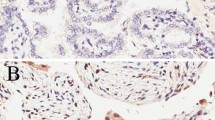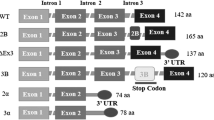Background:
Spontaneous apoptosis has been shown to predict tumor response to preoperative radiochemotherapy in rectal cancer. It remains to be elucidated, however, which genetic profile determines whether a tumor is more or less prone to apoptosis. Recently, a novel member of the inhibitor of apoptosis family, designated survivin, was identified. In the present study , we investigated the impact of survivin on tumor cell apoptosis and the risk to develop distant metastases or local failure after preoperative radiochemotherapy and surgical resection.
Patients and Methods: The expression of survivin, p53, bcl-2 and the apoptotic index was evaluated by immunochistochemistry on pretreatment biopsies of 54 patients with locally advanced adenocarcinoma of the rectum. Survivin expression was correlated to clinical and histopathological markers, the levels of spontaneous apoptosis, p53 and bcl-2, as well as to disease-free survival, 5-year rates of local failure and distant disease after preoperative radiochemotherapy and surgical resection.
Results: Survivin expression inversely correlated with the apoptotic index: High survivin expression was found in 56% of rectal carcinoma biopsies with a median apoptotic index of 1.22%. Conversely, low survivin expression in tumor cells was associated with a high median apoptotic index (2.29%, p=0.0001). High survivin expression also segregated with bcl-2 overexpression (65% bcl-2+ in tumors with high survivin expression as compared to 35% bcl-2+ in tumors with low survivin expression), but the difference was not statistically significant (p=0.1). Low survivin expression was significantly related to an increased disease-free survival rate (77% vs 18% at 5 years in tumors with high survivin expression, p=0.02) and to a redued risk for distant metastases (18% vs 78% at 5 years in tumors with high survivin expression, p=0.05) and local failure (6% vs 37% at 5 years in tumors with high survivin expression, p=0.07).
Conclusion: An inverse correlation between survivin expression and the level of spontaneous apoptosis in pretreatment biopsies suggests that survivin strongly inhibits tumor cell apoptosis in rectal cancer. Survivin expression may provide a novel predictive indicator for disease-free survival after preoperative radiochemotherapy and surgical resection in rectal cancer.
Hintergrund:
Für die spontane Apoptoserate konnte eine prädiktive Bedeutung für die Tumorantwort nach präoperativer Radiochemotherapie beim Rektumkarzinom gezeigt werden. Bisher ist nicht geklärt, welches genetische Profil die Apoptosefähigkeit eines Tumors bestimmt. Kürzlich wurde das Protein Survivin als ein neues Mitglied der Inhibitor-of-Apoptosis-Familie identifiziert. In der vorliegenden Studie wurd der Einfluss von Survivin auf die Apoptoserate sowie das Fernmetastasenrisiko und die Rate lokoregionärer Rezidive nach neoadjuvanter Radiochemotherapie und Operation des Rektumkarzinoms untersucht.
Patienten und Methoden: Die Expression von Survivin, p53, bcl-2 und die Apoptsoerate wurden immunhistochemisch in prätherapeutischen Biopsien von 54 Patienten mit lokal fortgeschrittenen Adenokarzinomen des Rektums bestimmt, die einheitich nach einem neoadjuvanten Radiochemotherapieprotokoll behandelt wurden. Die Survivin-Expression wurde mit klinischen und histopathologischen Markern, dem p53- und bcl-2-Index, dem Apoptoseindex, dem krankheitsfreien Überleben sowie dem Auftreten von Fernmetastasen oder lokoregionären Rezidiven korreliert.
Ergebnisse: Die Survivin-Expression korrelierte invers mit dem Apoptoseindex: Bei hoher Survivin-Expression (56% aller Tumoren) betrug der mediane Apoptoseindex 1,22%, bei niedriger Survivin-Expression 2,29% (p=0,0001). Eine erhöhte Survivin-Expression war auch mit einer bcl-2-Überexpression assoziiert (65% bcl-2+ in Tumoren mit hoher Survivin-Expression, 35% bcl-2+ in Tumoren mit niedriger Survivin-Expression, p=0,1). Bei niedriger Survivin-Expression betrug das krankheitsfreie Überleben nach 5 Jahren 77%, bei hoher Survivin-Expression 18% (p=0,02). Die Fernmetastasenrate und die Rate an lokoregionären Rezidiven betrugen nach 5 Jahren bei Tumoren mit niedriger bzw. hoher Survivin-Expression: 18% vs. 78 % (p=0,05) bzw. 6% vs. 37% (p=0,07).
Schlussfolgerung: Die signifikant inverse Korrelation zwischen der Survivin-Expression und der spontanen Apoptoserate in prätherapeutischen Biopsien weist darauf hin, dass Survivin beim Rektumkarzinom die Apoptose der Tumorzellen inhibiert. Die Survivin-Expression kann als neuer prädiktiver Indikator für das krankheitsfreie Überleben nach präoperativer Radiochemotherapie und Operation gelten.
Similar content being viewed by others
Author information
Authors and Affiliations
Additional information
Received: February 13, 2002; accepted: May 16, 2002
Rights and permissions
About this article
Cite this article
Rödel, F., Hoffmann, J., Grabenbauer, G. et al. High Survivin Expression is Associated with Reduced Apoptosis in Rectal Cancer and May Predict Disease-Free Survival after Preoperative Radiochemotherapy and Surgical Resection. Strahlenther Onkol 178, 426–435 (2002). https://doi.org/10.1007/s00066-002-1003-y
Issue Date:
DOI: https://doi.org/10.1007/s00066-002-1003-y




